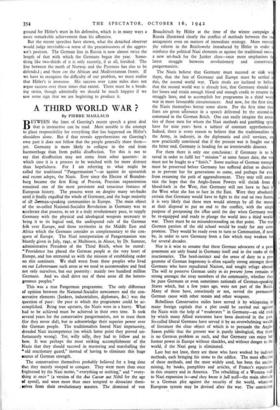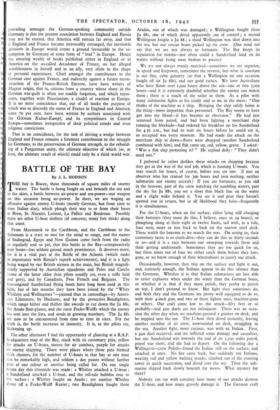A THIRD WORLD WAR?
By PIERRE MAILLAUD
BETWEEN the lines of Goering's recent speech a great deal that is instructive can be read. Most notable is the attempt to place responsibility for everything that has happened on Hitler's shoulders alone. But if that reveals apprehensions on Goering's own part it does not follow that the people generally share them— yet. Germany is more likely to collapse in the end from haemorrhage than from public disaffection. Yet this is not to say that disaffection may not come from other quarters: in which case it is a process to be watched with far more distrust than hopefulness. For I am referring to what might be called the traditional "Pangermanism "—as against its upstartish and recent adepts, the Nazis. Ever since the Elector of Branden- burg became the first King of Prussia, Prussian expansionism remained one of the most persistent and tenacious features of European history. The process went on despite many set-backs until it finally engulfed the whole of Germany, and the huge majority of all 5erman-speaking communities in Europe. The main object of the so-called National-Socialist Revolution in Germany was to accelerate that process, to set it a truly revolutionary pace, to supply Germany with the physical and ideological weapons necessary to bring it to its logical end, the undisputed rule of the German folk over Europe, and those territories in the Middle East and Africa which the Germans consider as complementary to the con- quest of Europe. The Nazi interpretation of Pangermanism was bluntly given in July, 1941, at Mulhouse, in Alsace, by Dr. Sumner, administrative President of the Third Reich, when he stated :
Providence has placed the German people at the very heart of Europe, and has entrusted us with the mission of establishing order on this continent. We shall wrest from these peoples who lived on our Lebensraum such areas as we need to accommodate and feed not only ourselves, but our posterity : mainly two hundred million Germans. And wc shall drive out of these areas all the hetero-L geneous peoples."
This was a true Pangerman programme. The only difference of opinion between the National-Socialist newcomers and the con- servative elements (Junkers, industrialists, diplomats, &c.) was the question of pace: the pace at which the programme could be ac- complished. Being true upstarts, the Nazis were in a hurry. What had to be achieved must be achieved in their own time. It took several years for the conservative pangermanists, not to trust them (for they never did), but to acknowledge their superior power over the German people. The traditionalists feared Nazi impetuosity, dreaded Nazi incompetence (on which latter point they proved un- fortunately wrong). Yet, willy nilly, they had to follow and to bow. It was perhaps the most striking accomplishment of the Nazis that they should succeed in mustering and marshalling the old reactionary guard," instead of having to eliminate this huge source of German strength.
The conservatives themselves probably believed for a long time
that they merely stooped to conquer. They were more than once frightened by the Nazi motto, "everything or nothing," and "every- thing at once" (a version of the Aut Caesar met Nihil for the age of speed), and were more than once tempted to dissociate them- selves from their revolutionary masters. The dismissal of von
Brauchitsch by Hitler at the time of the winter campaign Russia illustrated clearly the conflict of methods between the na, antagonists even on matters of immediate strategy. More recent] the reform in the Reichswehr introduced by Hitler in order t reinforce the political Nazi elements as against the traditional ones a new set-back for the Junleer class—once more emphasises th latest struggle between revolutionary and conservativ pangermanists.
The Nazis believe that Germany must succeed or sink wi them, that the fate of Germany and Europe must be settled this, the second world war. Their rivals are inclined to believ that the second world war is already lost, that Germany should cur her losses and retain enough blood and enough credit to resume the struggle later, and to accomplish her programme in a third world war in more favourable circumstances. And now, for the first time, the Nazis themselves betray some alarm. For the first time their fears are given utterance in a speech delivered by the second-in- command in the German Reich. One can easily imagine the anxie. ties of those men for whom the Nazi methods and gambling spir have for nine years been a subject of constant apprehensions Indeed, there is every reason to believe that the traditionalists the Army, in industry, in the diplomatic and civil services, ar now practically convinced that if the present war is fought out t the bitter end, Germany is heading for an irretrievable disaster.
For them there is only one conclusion: if Germany is to be saved in order to fulfil her "mission" at some future date, the war must not be fought to a "finish." Some nucleus of German strength must be preserved before Germany has suffered defeat so decisive as to prevent her for generations to come, and perhaps for ever, from resuming the path of aggrandisement. They may still enter• tam n the hope that the Anglo-Saxon Powers will shrink from a blood-bath in the West, that Germany will not have to face in the West what she has to face in the East. Were they absolutely certain that Germany would have to fight to the end on two fronts, it is very likely that these men would attempt by all the means at their disposal to put an end to the conflict, with the single purpose of postponing the istue until the day when Germany may be re-equipped and ready to plunge the world into a third world- war. There must be no misunderstanding on that point. The true German patriots of the old school would be ready for any com- promise. They would be ready even to turn to Communism, if need be, in order to save Germany from a fate which may weaken her for several decades.
Nor is it wise to assume that these German advocates of a post- ponement are only found in Germany itself and in the ranks of the reactionaries. The herd-instinct and the sense of duty to a pro- gramme of German hegemony is often equally strong amongst those Germans who have repudiated Nazism, and sought refuge abroad. The will to preserve German unity in its present form remains as strong amongst the stray members of the community, whether they be pure Germans or even sometimes nationals of German-speaking States which, but a few years ago, were not part of the Reich. Many of those have, consciously or not, served the permanent German cause with other means and other weapons.
Rebellious Conservative exiles have served it by whispering in many foreign capitals that a plot could be carried out against the Nazis with the help of "moderates" in Germany—an old trick by which many Allied statesmen have been deceived in the past So-called liberal Germans have served it by an overwhelming wealth of literature the clear object of which is to persuade the Anglo- Saxon public that the present war is purely ideological, that there is no German problem as such, and that Germany can enjoy her former power in Europe without shackles, and without danger to the world, if the Nazi gang is eliminated.
Last but not least, there are those who have worked by indirect methods, each bringing his stone to the edifice. The most effective of these methods, and the most widely used, has been the under- mining, by books, pamphlets and articles, of France's reputation in this country and in America. The rebuilding of a Western wall to Nazi expansion is—and they know it full well—the main obstacle to a German plot against the security of the world, whatever European system may be devised after the war. The conviction
prevailing ' amongst_ the German-speaking community outside Germany is that the present association between England and Russia may not be eternal, that America will remain far away, and that if England and France became irrevocably estranged, the inevitable divisions in Europe would create a ground favourable to the re- sumption by Germany of some form of " lead " in Europe. Hence the amazing wealth of books published either in England or in America on the so-called decadence of France, on her alleged worthlessness in herself and as an ally, very often in the shape of personal experiences. Chief amongst the contributors to the German case against France, and indirectly against a future recon- struction of the Franco-British Entente, have been writers of Magyar origin, that is, citizens from a country whose share in the German war-guilt is often too readily forgotten, and which repre- sents, together with Prussianism, a citadel of reaction in Europe. It is no mere coincidence that, out of all books the purpose of which was to discredit the name of France in England and America, some 70 per cent, have been written by authors associated with the German Kultur-Kampf, and its sympathisers in Central Europe—sometimes irrespective of their political creeds and even religious convictions.
That is no coincidence, for the task of driving a wedge between England and France remains a foremost contribution to the struggle for Germany, to the preservation of German strength, to the rebuild- ing of a Pangerman unity, the ultimate objective of which (or, at least, the ultimate result of which) could only be a third world war.



























 Previous page
Previous page